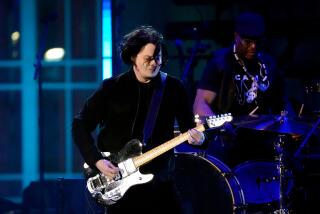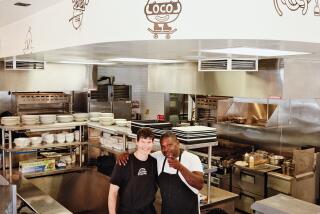Long Road Back : Neighborhoods: The Watts Summer Festival continues its modest comeback for second year in a row. The event, which began 25 years ago, had appeared to be a casualty of gang violence.
- Share via
Two years ago, the Watts Summer Festival had been all but pronounced dead. The once proud tradition, begun as a memorial to the 34 people killed in the 1965 Watts riot, had become another casualty of gang violence in South-Central Los Angeles.
City and county officials refused to issue permits for the event, corporate sponsors stopped donating money, and organizers of the festival, desperate to keep some semblance of it alive, resorted to holding small gatherings each year on their front porches.
But on Saturday, for the second year in a row, the Watts Summer Festival was back in the streets of South-Central, this time on the occasion of its 25th anniversary. The comeback has been funded by the Brotherhood Crusade and made possible by a move to a “gang neutral” location outside of Watts.
In August, 1966, tens of thousands of celebrants poured into a six-block stretch of 103rd Street, where a year earlier flames and gunfire had erupted.
The crowd this year numbered in the hundreds, not the thousands, and the scaled-down festival was held in an industrial area north of Watts. But to organizers and many in attendance, it was like an old friend coming home after a long, hard journey.
“We can’t just let these things go and forget about what happened,” said Mary Dorsey, a Compton high school teacher who lived in South-Central in the late 1960s. “This helps people to remember. I don’t know anybody here, yet I still feel a sense of family.”
It has been a slow and difficult resuscitation. With corporate sponsors no longer interested in the festival, organizers have depended on support from the Brotherhood Crusade, a social services agency that was also born out of the violence of 1965.
Brotherhood Crusade funded this year’s festival’s $12,000 budget, and also opened the grounds and parking lot of its Slauson Avenue headquarters for the event. The organization also paid for last year’s festival and has helped devise a five-year plan that envisions a permanent festival location at a theme park somewhere in the area.
“It is critical that these kinds of festivals survive because of the climate that exists in the city today as it relates to the rise in racial intolerance and the calls . . . from leadership for unity,” said Ralph D. Sutton, who has helped coordinate the festival for Brotherhood Crusade. “We need to have a vehicle for cultural expression for local artists and entertainers, and we need to have a forum for open discussion of concerns specific to the African-American community.”
The one-day festival was a modest undertaking. There were just two carnival rides--two more than last year, as one young mother pointed out--and about a dozen vendors selling food, books, hair products, African clothing and art. Several local music and dance groups, including Allah’s Army and Kuzzins, provided entertainment in the afternoon, and evening events were to include a reunion of the Watts Prophets, a poetry-reading group that performed at the first festival.
David Payne, 50, a native of Watts who vividly recalls the first festival 25 years ago, said he was disappointed when he arrived Saturday. As he sat in traditional African garb under the shade of a large pine tree, he reflected on how much his neighborhood has changed over the years, and how the struggling festival mirrored those changes.
“I think that first festival provided a healing by bringing so many different groups together and giving us a lot of different information,” he said. “I went to college after that. There were companies at the festival offering jobs and scholarships. Now the festival is basically an eatery. It is good to have food, but after the food is gone, there needs to be more.”
Festival organizers acknowledged that they have a long way to go to restore the event to its original glory, but they said the process is gradual and will take several years of hard work and public relations.
Tommy Jaquette, executive director of the Watts Summer Festival Committee, said city officials agreed to the festival’s renaissance in part because its new location is an industrial area regarded as “gang neutral.” Jaquette, who has been involved with the festival since 1966, said organizers hope this year’s modest endeavor will help restore the festival’s reputation so that next year it can be expanded to two days.
“We are in a reconstructive mode right now,” Jaquette said. “It is on the path to recovery. We hope each year will be bigger and better. But it is going to take time.”
In 1966, dignitaries from Washington to Sacramento descended on Watts for the first festival, which included a 2 1/2-mile parade led by R. Sargent Shriver, then director of the U.S. Office of Economic Opportunity for President Lyndon B. Johnson. Entertainment was provided by soul musician James Brown.
By 1972, the festival had grown to include a popular soul concert at the Coliseum that drew more than 70,000 people and became the subject of a profitable movie and a hit album, both entitled “Wattstax.”
But by 1974, the festival began falling on hard times. Fewer than 8,000 people attended the Coliseum concert that year because of bomb threats and a bus strike, leaving the festival committee with a $150,000 debt. The festival was canceled in 1977 because of financial problems. In 1978, county officials at Will Rogers Park refused to allow gospel musicians to plug in their sound equipment. The show went on, in part, when a local television crew volunteered use of its generator.
Growing problems with drunken youths and violent gang members forced organizers to move the festival from Will Rogers Park to a fenced-in lot on Imperial Highway, where it was hoped crowds could be controlled more easily. Then, Los Angeles police began objecting to the event because of continued street-gang violence.
More to Read
Sign up for Essential California
The most important California stories and recommendations in your inbox every morning.
You may occasionally receive promotional content from the Los Angeles Times.









